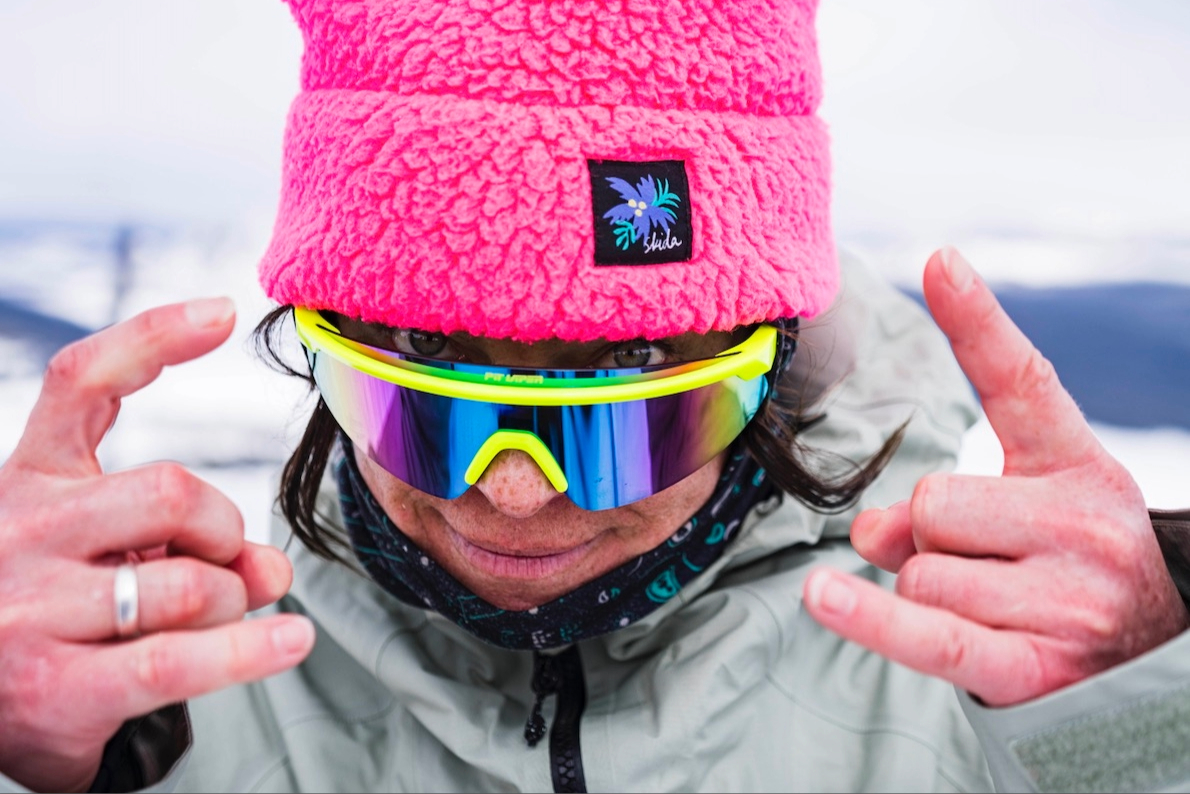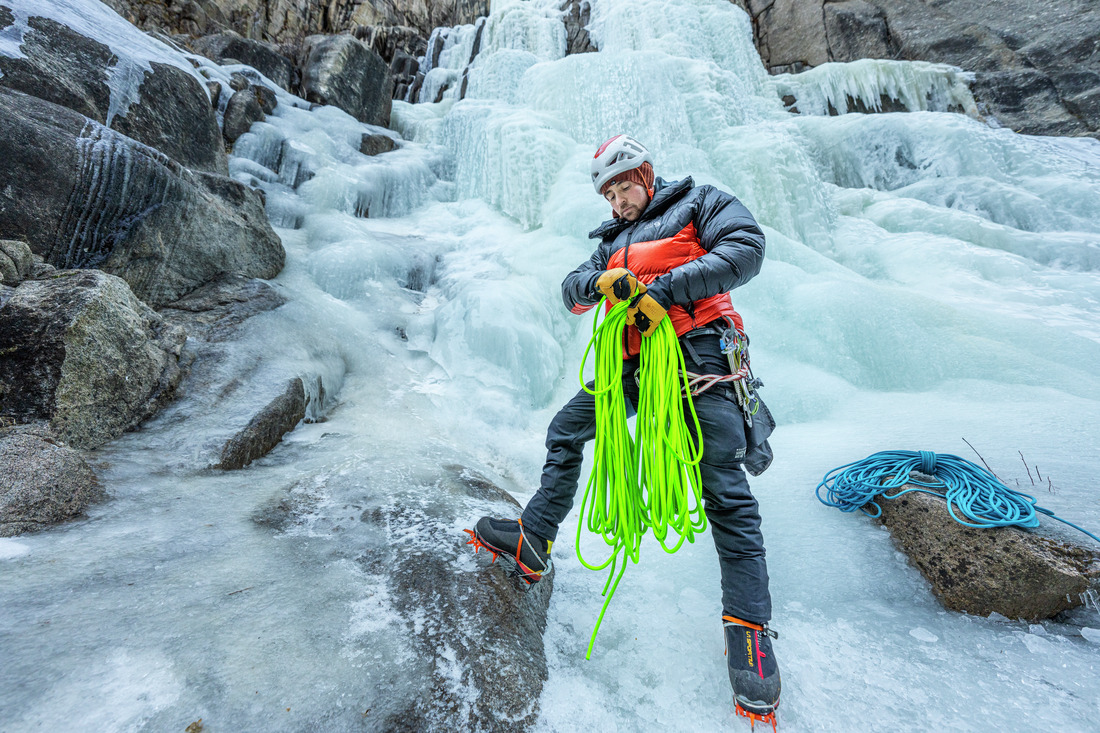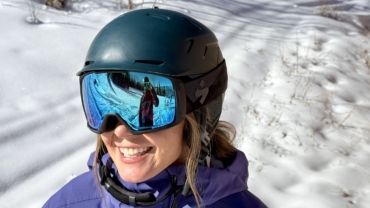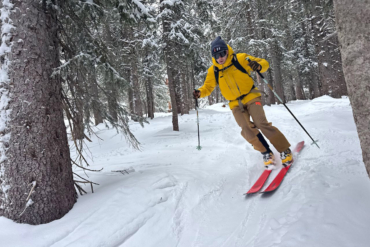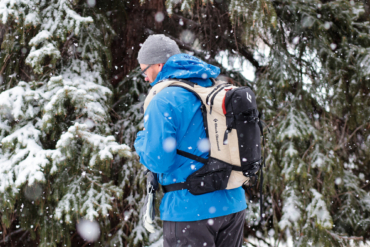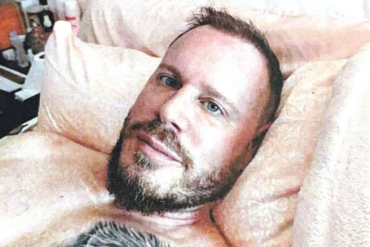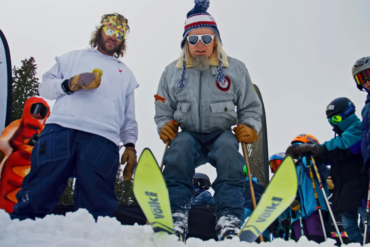Pro skier and Mountain Hardwear athlete Rachael Burks brings electric, ball-lightning enthusiasm to the slopes. I witnessed it first-hand in Jackson Hole, Wyo., in March, when I backcountry skied with her in Grand Teton National Park. She never stops beaming, laughs infectiously, and, of course, shreds so hard it’ll bring a tear to your eye to watch.
It’s no wonder the longtime Salt Lake City resident has been so involved and spent so much time competing around the world. Burks won the Red Bull Cold Rush competition in 2012, appeared in three Warren Miller movies and three Teton Gravity Research films, and starred in female-forward ski films like Pretty Faces (2014) and Going Greenland (2022).
The passion Burks has for the sport might truly be unequaled.
Last year, the 42-year-old pro skier signed on with the Range of Motion Project (ROMP) and was a part of a team of athletes — 14 of whom represented the limb-loss and limb-different community — who attempted to ascend Cayambe, one of the three tallest mountains in Ecuador at 18,996 feet. ROMP is a nonprofit organization that provides prosthetic care for underserved people.
This September, Burks, along with a team of world-renowned athletes from the limb-loss and limb-different community will be attempting to climb Cotopaxi for the organization’s 10th anniversary fundraiser.
Following our Mountain Hardwear Wyoming shred fest, GearJunkie connected with Burks to talk about her career, the status of women in pro skiing, the Mountain Hardwear athlete’s favorite gear, and, of course, her upcoming adventure in Ecuador, accompanying a team of prosthetic users to the glacier-capped peak of the country’s second highest mountain.
Q&A With Rachael Burks
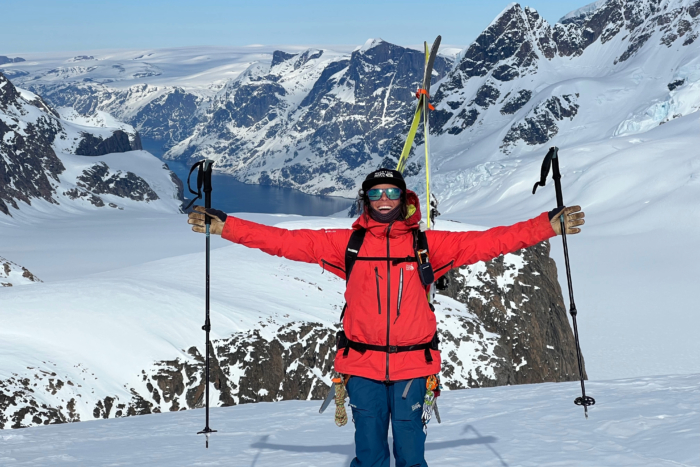
GearJunkie: What is your ski background, and how did you end up in Utah?
Rachael Burks: I was born in California, and my parents are both from the Midwest. My father moved us to Salt Lake City in 1988 … I didn’t really know that I liked skiing until I moved away. I went to college in Dallas, Texas. And that was it for me. That was my awakening. I didn’t have access to the outdoors in the same way. And I didn’t realize that I loved it the way I did. And so I left.
I moved back to Utah, got a job at Snowbird in a rental shop, and started skiing every day. That was kind of my big pivot, my big turning point. I was the happiest person on the planet because I wasn’t in Texas.
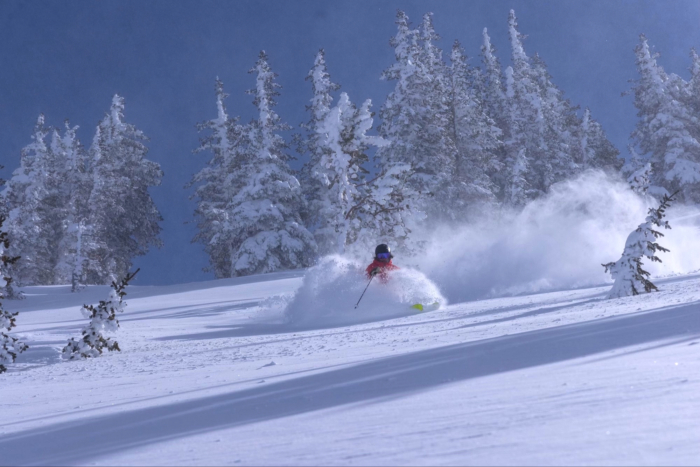
How did you get into pro skiing from there?
I had some friends that said, “Hey, Burks. You’re pretty good at skiing. You should you should do one of those competitions.” And I thought that they were completely making fun of me. So I literally, told them to kind of like, “F*ck off,” you know? Then, I went and watched one of the competitions and realized I could. And I wanted to.
So, I entered a competition the next year. I met friends, did okay, and started competing on the World Free Skiing Tour (before the World Freeride Tour). I kicked up some sponsors, and the rest is history.
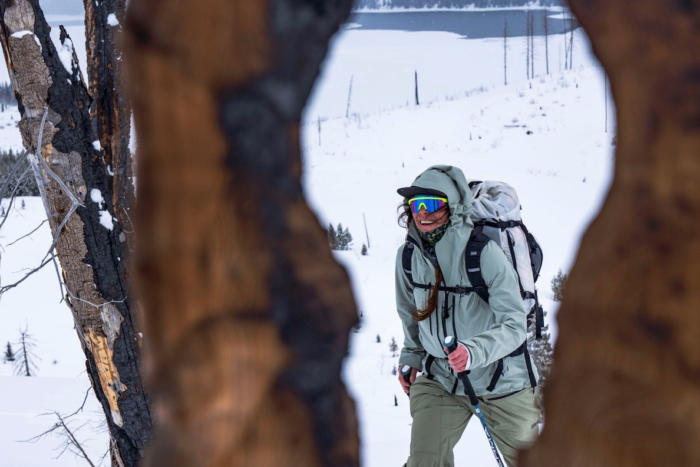
So you watched the World Free Skiing Tour and thought to yourself, ‘Oh yeah, I could compete with these skiers’?
Well, truth be told, I watched the women compete and the disparity between the men’s performance and the women’s performance was so great that I was immediately infuriated. I was like, ‘This is bullshit. Women are capable of more.’
There was a time when women were rewarded for, like, a really fast, fluid run down and men were hitting cliffs, getting inverted, really putting it all on the line. And like the woman that just skied really fast and fluidly from the top to the bottom was getting rewarded. That’s absolutely ridiculous because women are perfectly comfortable or capable of hitting cliffs and doing technical lines and doing tricks.
So that was kind of what fueled my fire, recognizing right off the bat that’s just not a proper representation of what women are capable of. And I was immediately out to prove that.
What are some of the things that are important to you and that you want people to take away from your ski career?
I’ve had a very long career, right? I’ve been a sponsored skier for 18 years, which is pretty remarkable. And I’m very proud of that.
But I want to look back on my very earliest interviews and be able to say that I’ve always been in it for the progression of women, just like women in the sport. And I know this sounds a little self-righteous, but it really has been about the progression of the sport as a whole. For me, it has not been about my own personal career.
I was lucky enough to kind of be in the renaissance of women’s visibility, if you will. When I was first getting into it … I was super pissed because there wasn’t a ton of female visibility in skiing. There was a token female in my VHS movies. And then there was like maybe one photo of a girl in a ski magazine in print … So from the very beginning, I’ve just always been out to be a visible woman that can inspire the next generation.
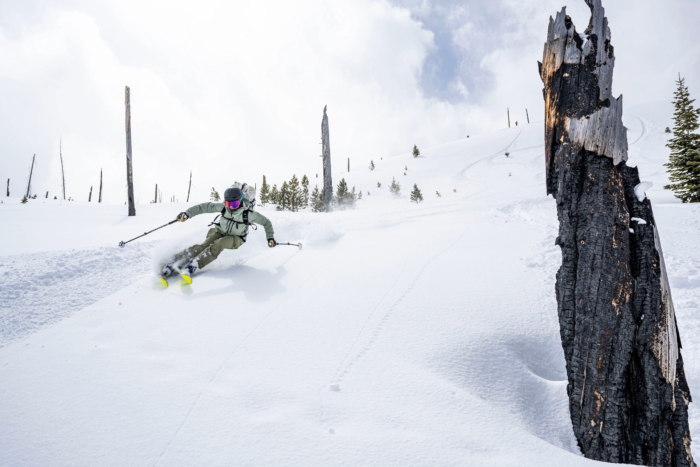
What are your thoughts on the status of women in skiing and the ski industry today?
I [happy] cry every single time I go to Alta. Because I’m so stoked to see, like, the little trains of rippers hitting a jump and doing 360s and getting inverted, and they stomp it, and a big braid comes out of the jacket or out of their helmet, and you’re just like, “Yes! That’s a girl!” Yeah, I love it.
So I mean, are we where we need to be? F*ck no. But it’s just really exciting to see how much has changed … There’s a lot more opportunity for women to be visible and show what they’re capable of.
You posted that you were named a team captain for the Climbing for ROMP 10th Anniversary Fundraiser. Can you tell us about that?
I’m so excited about this. I got to attempt an ascent of Cayambe last year with a group of 14 limb-loss and limb-different athletes. The climb is to fundraise and raise awareness for what the Range of Motion Project (ROMP) is.
ROMP is a nonprofit that believes mobility is a basic human right, and that people who don’t have access to mobility and high-end prosthetic care need them. The Range Motion Project provides high-end prosthetic care to people who don’t have access to it in underserved countries. They have clinics in Guatemala and Ecuador right now. And, it’s really exciting.
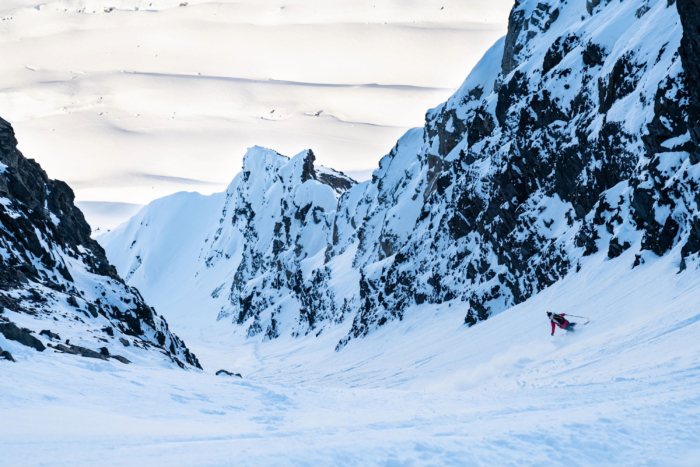
How does the climb help to raise awareness and funding?
You get these incredible limb-loss, limb-different athletes who have had access to prosthetic care for their whole lives, and they are climbing 20,000-foot volcanoes because of that access. I mean, it’s amazing. The world is their oyster, they can do whatever the f*ck they want because they’ve had access to prosthetic care.
Every single dollar [donated] goes towards prosthetic care. [ROMP] has literally outfitted over 5,000 humans with prosthetics … like, they’re outfitting a 6-year-old in the Ecuadorian Amazon with a prosthetic foot, or a leg … And all of a sudden, at 6 years old, she walks for the first time. It’s such a cool organization.
And you were named a team captain this year — what does that entail?
So, it’s the 10th year and ROMP is attempting the three highest peaks in Ecuador with three separate teams of athletes representing the limb-loss, limb-different community. So you’re going to have a very large concentration of these athletes hiking up 20,000-foot volcanoes this September. And ROMP asked me to help. I’m a team captain this year, so I’m gonna help lead one of the teams I think up Cotopaxi.
We’re attempting to raise $500,000, which will enable a new ROMP clinic to be built.
Gear She Won’t Go Without
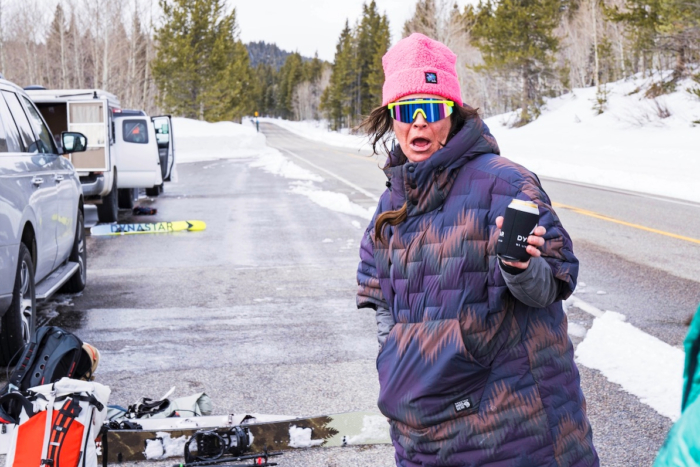
Of course, GearJunkie couldn’t let an athlete like Burks go without talking about some gear. After all, she spends most of her winter using and wearing ski equipment and apparel constantly. So, we asked Burks to give us the short list of her favorite, can’t-go-skiing-without-it gear.
- Pit Viper Sky Surfers — “I wore them the whole time we were in Jackson. I’m kind of obsessed with them.”
- Pit Viper Voltage Goggles — “These are some legit goggles.”
- Dynastar Freeride 108s — “Those skis have taken the industry by storm and they’ve taken my heart by storm.”
- Modelo 24 pack — “Let’s be honest, après is a very important part of skiing.”
- Mountain Hardwear Ghost Whisperer Down Jacket — “It goes everywhere with me. It’s the kind of thing that keeps you warm. Truly keeps you warm. Just enough. Or like, when you are in dire straits. It’s a fantastic one.”
- Mountain Hardwear Women’s Phantom Alpine Jacket — “It’s a staple. It’s worked in the Arctic for me. And then it doesn’t get put away for the winter. It’ll go up with me for pretty much anything I’m going to be doing any alpine.”
- Mountain Hardwear Micro Chill Full Zip — “There’s nothing really ‘sexy’ about this layer. But again, you want year-round versatility? Like, just a basic fleece is so clutch to have in your quiver.”
- Mountain Hardwear Stretchdown Poncho — “A Stretchdown poncho is just sick.”
- Mountain Hardwear Snowski Woski Backpack — “Every time I use it, I think to myself, ‘Man, I love this backpack.’ It’s such a good backpack.”
- Mountain Hardwear Phantom GORE-TEX Sleeping Bag — “That’s my home away from home. I’ve taken that with me all over the world.”
- Skida Women’s Alpine Hat
- Smith Summit Mips Ski Helmet
- Hestra Tarfala 5-Finger Gloves
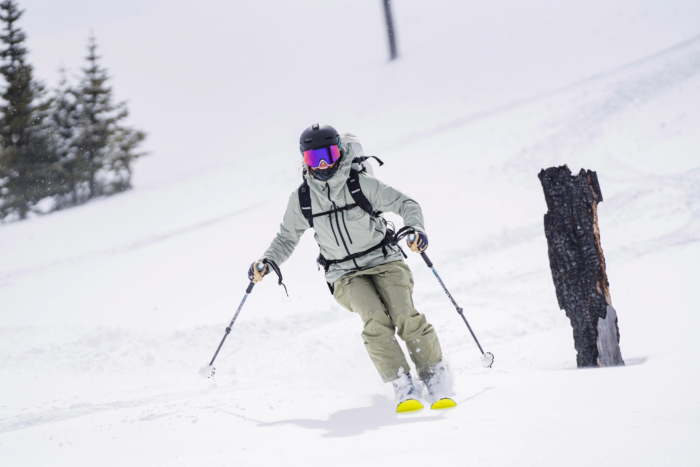
Follow Rachael Burks on all her adventures via her Instagram account @rachaelburks. For more info on her September ascent of Cotopaxi with the Climb for ROMP 10th Anniversary event. And to learn even more about the pro skier you can read through her athlete bio on the Mountain Hardwear website.
To contribute to the ROMP 10th Anniversary, visit the ROMP website and check out Burks’ personal fundraising page for the 10th Anniversary Climb for ROMP fundraiser.
